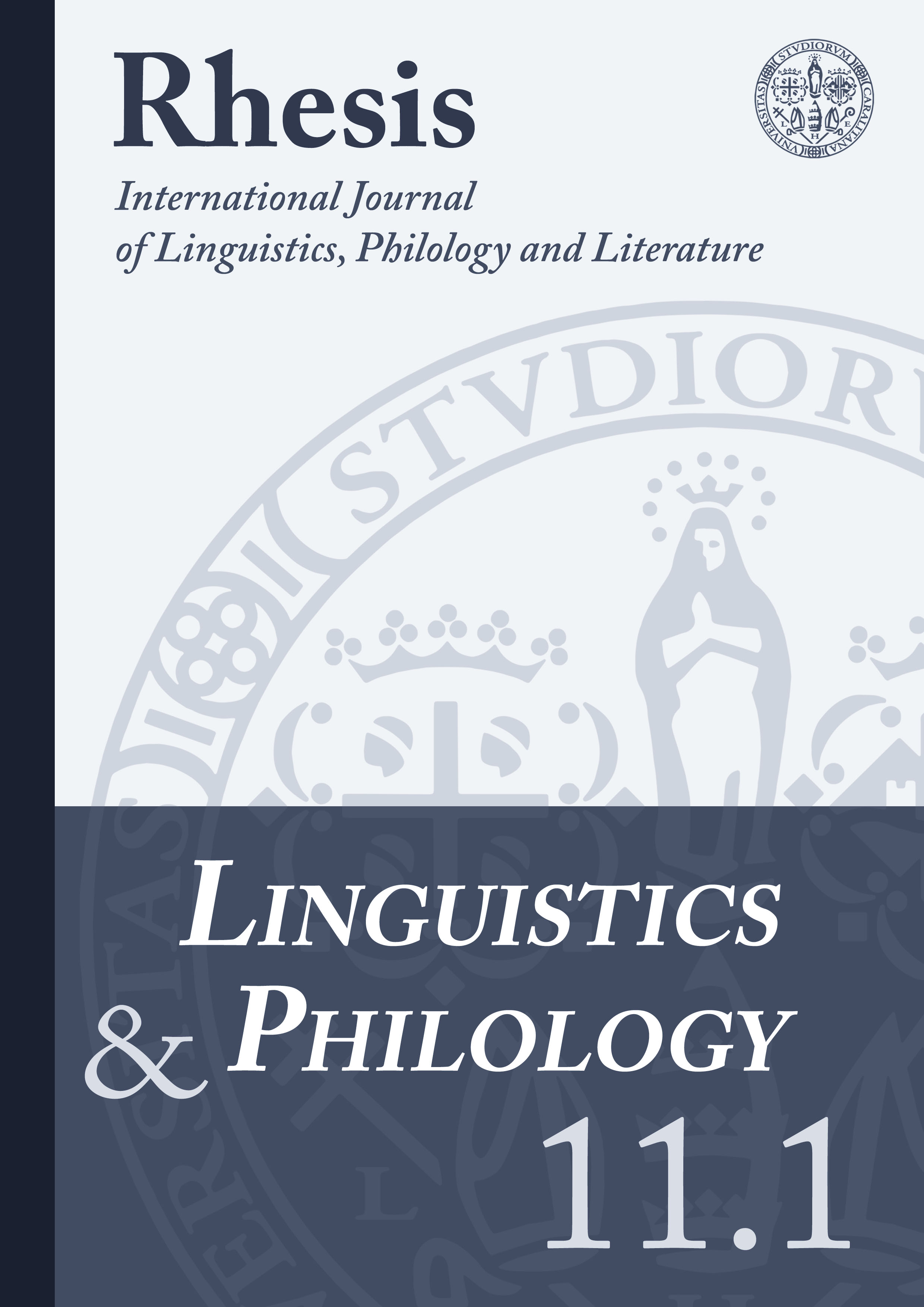Nuove prospettive ecdotiche per la retorica demostenica
Abstract
To a large extent, the orations included in the Demosthenicum corpus consist of real deliberative or judicial discourses. The most famous of these were intended to persuade the public (boule, ecclesia, courts) to pursue the battle that will be the leitmotiv of Demosthenes’ life: a strenuous and desperate defence of Athenian freedom, against Philip II of Macedonia. His failure as a politician, however, did not affect his success as a speaker. The Demosthenic style, with its incredible variatio, immediately became object of study and imitation. However, when the Demosthenic oratory conquered the ancient school, its intrinsic variety was not always appreciated. Numerous papyri, that bear passages of his orations, show the high frequency of emendations, in order to revise and normalise the text. The constitutio textus, therefore, poses many difficulties to modern publishers, obliged to choose between numerous, equivalent, textual variants. Many ancient manuscripts reveal how principles such as lectio brevior always intended as lectio difficilior cannot be applied uncritically to real, not fictitious, oratory.
Downloads
References
Blass, Friedrich (18932) [1862], Die attische Beredsamkeit. Demosthenes, Leipzig, Teubner.
Canevaro, Mirko (2018), ‘Demosthenic Influences in Early Rhetorical Education’, in Canevaro, Mirko; Gray, Benjamin (eds.), The Hellenistic Reception of Classical Athenian Democracy and Political Thought, Oxford, Oxford University Press, 73-91.
Canfora, Luciano (1967), ‘Per la storia della Terza Filippica di Demostene’, Belfagor 22, 152-165.
Canfora, Luciano (1968), ‘Per il testo della Terza Filippica di Demostene’, Rheinisches Museum für Philologie 111, 193-197.
Canfora, Luciano (1971), Demostene. Discorso all’assemblea per ambascerie in Asia e in Grecia, Bari, Adriatica Editrice.
Canfora, Luciano (1974), Discorsi e Lettere di Demostene, 1, Torino, UTET.
Canfora, Luciano (1992), Demostene. Terza Filippica, Palermo, Sellerio.
Canfora, Luciano (20162) [1974], Conservazione e perdita dei classici, Padova, Stilo Editrice.
Canfora, Luciano (2019), ‘Afterlife (Antiquity and Byzantine Era)’, in Martin, Gunther (ed.), The Oxford Handbook of Demosthenes, Oxford, Oxford University Press, 431-451.
Cavallo, Guglielmo (1986), ‘Conservazione e perdita dei testi greci: fattori materiali, sociali, culturali’, in Giardina, Andrea (ed.), Società romana e impero tardoantico. Tradizione dei classici, trasformazioni della cultura, Roma-Bari, Laterza, 83-172.
Chevallier, Raymond (1960), ‘L’art oratoire de Démosthène dans le Discours sur la Couronne’, Bulletin de l’Association Guillaume Budé 2, 200-216.
Clark, Albert C. (1918), The Descent of Manuscripts, Oxford, Clarendon Press.
Denniston, John D. (1952), Greek Prose Style, Oxford, Clarendon Press.
Dover, Kenneth James (1997), The Evolution of Greek Prose Style, Oxford, Clarendon Press.
Drerup, Engelbert (1899), Antike Demosthenesausgaben, Leipzig, Dieterich.
Fuhr, Carolus (1914), Demosthenis Orationes. Editio Maior. Orationes I-XIX continens, 1, Lipsiae, B. G. Teubneri.
Giaquinta, Irene (2019), Le Epistole di Demostene. Introduzione, traduzione e commento retoricofilologico, Alessandria, Edizioni dell’Orso.
Grenfell, Bernard P.; Hunt, Arthur S. (1904), The Oxyrhynchus Papyri IV, London, Egypt Exploration Fund.
Harris, Edward M. (2019), ‘Speeches to the Assembly and in Public Prosecutions’, in Martin, Gunther (ed.), The Oxford Handbook of Demosthenes, Oxford, Oxford University Press, 378-379.
Johnson, William A. (2004), Bookrolls and Scribes in Oxyrhynchus, Toronto, University of Toronto Press.
Kapparis, Konstantinos A. (2014), ‘The Transmission of Apollodoros and the Edition of Mervin Dilts’, in Grusková, Jana; Bannert, Herbert (Hrsgg.), Demosthenica libris manu scriptis tradita. Studien zur Textüberlieferung des Corpus Demosthenicum. Internationales Symposium in Wien, 22.-24. September 2011, Wien, Wiener Studien, 107-128.
Lowe, Elias A. (1946), ‘The Oldest Omission Signs in Latin Manuscripts: Their Origin and Significance’, Studi e testi 126, 36-79.
Mathieu, Georges (1948), Démosthène. L’homme et l’œuvre, Paris, Boivin.
Mazzucchi, Carlo M. (2010), ‘Per la storia medievale dei codici biblici B e Q, del Demostene Par. Gr. 2934, del Dione Cassio Vat. Gr. 1288 e dell’Ilias picta ambrosiana’, in Bravo García, Antonio; Pérez Martín, Inmaculada (eds.), The Legacy of Bernard de Montfaucon: Three Hundred Years of Studies on Greek Handwriting. Proceedings of the Seventh International Colloquium of Greek Paleography (Madrid-Salamanca, 15-20 September 2008), Turnhout, Brepols Publishers, 133-141.
McCabe, Donald F. (1981), The Prose-Rhythm of Demosthenes, New York, Arno Press.
McDowell, Douglas M. (2009), Demosthenes. The Orator, Oxford, Oxford University Press.
McNamee, Kathleen (1981), Abbreviations in Greek Literary Papyri and Ostraca, Ann Arbor, Scholars Press.
Norden, Eduard (1986), La prosa d’arte antica: dal VI secolo a.C. all’età della Rinascenza, Roma, Salerno Editrice (Die antike Kunstprosa, Leipzig, Teubner, 1898).
Pasquali, Giorgio (1952) [1934], Storia della tradizione e critica del testo, Firenze, Le Monnier.
Ronnet, Gilberte (1951), Étude sur le style de Démosthène dans les Discours politiques, Paris, Éditions de Boccard.
Sealey, Raphael (1993), Demosthenes and His Times: A Study in Defeat, New York, Oxford University Press.
Trevett, Jeremy (2019), ‘Authenticity, Composition, Publication’, in Martin, Gunther (ed.), The Oxford Handbook of Demosthenes, Oxford, Oxford University Press, 427-428.
Turner, Eric G.; Parsons, Peter J. (19872) [1971], Greek Manuscripts of the Ancient World, Oxford, Clarendon Press.
Voemel, Theodor (1862), Orationes contra Aeschinem: De corona et De falsa legatione, cum argumentis Graece et Latine, Lipsiae, B. G. Teubneri.
Vogel, Friedrich (1923), ‘Die Kurzenmeidung in der griechischen Proza des IV. Jahrhunderts’, Hermes 58, 87- 108.
Wooten, Cecil W. (2019), ‘Rhetorical Technique’, in Martin, Gunther (ed.), The Oxford Handbook
of Demosthenes, Oxford, Oxford University Press, 407-417.
Worthington, Ian (2019), ‘The Epitaphios, Erotikos, Prooimia and Letters’, in Martin, Gunther (ed.), The Oxford Handbook of Demosthenes, Oxford, Oxford University Press, 403-404.



